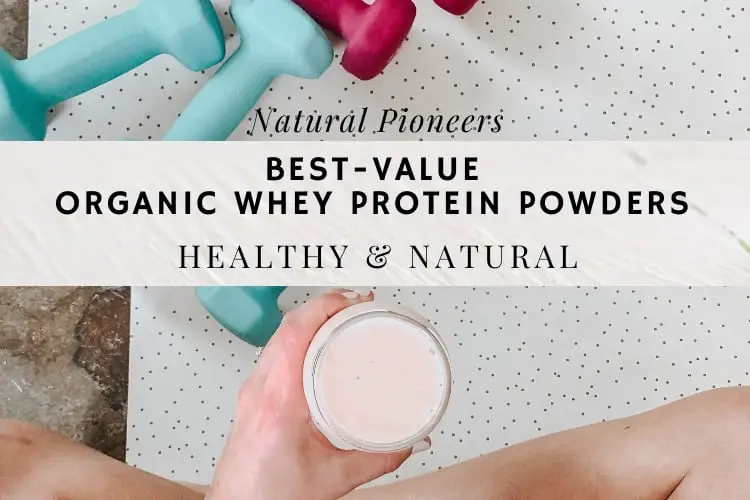
There is a lot of confusion about the difference between natural, grass-fed, organic and Non-GMO protein powder. This article will give you a clear understanding of the differences and will leave you with no doubt as to what protein powder to buy.
Whey protein powder is a natural product and shows superior health benefits to other protein powders. Organic whey protein powder is healthiest, providing more omega-3’s, PUFAs, ALA, & CLA. Natural, organic whey protein powder prices range between 0.05-0.19 USD /g of protein.
Let’s dive into the topic of protein powders, what to avoid and the price comparison of clean, natural products.
1. Is Protein Powder Natural?
“Is it even natural” ? Protein powder has its advocates and its critics. Even among our Natural Pioneer Community we find that the use of protein powder comes in phases.
At times, we’re all into it – and at other times we turn our back on it.
Let’s clarify: Whey protein powder originally comes from milk, which is a product nature provides us with, and “natural” is defined by the USDA (United States Department of Agriculture) as:
Food labeled “natural”, according to the USDA definition, does not contain artificial ingredients or preservatives and the ingredients are only minimally processed. And “Natural” and “All-Natural” are identical.
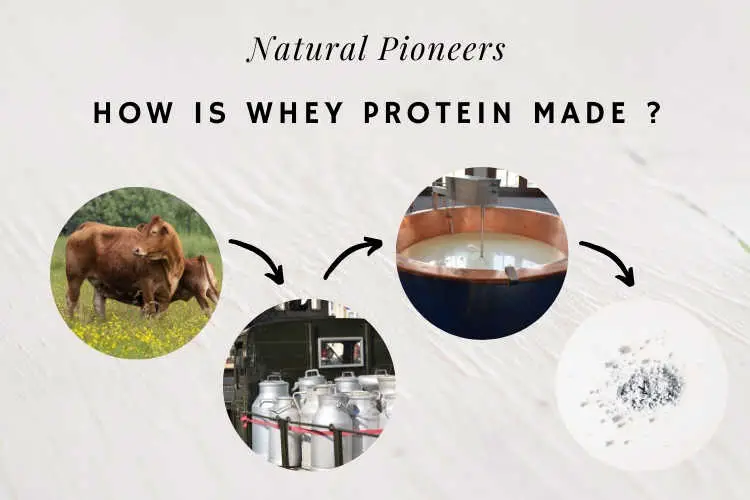
So far so good. Let’s take a look at how whey protein powder is made:
- Dairy Farm: It all starts at a dairy farm where cows live their privileged organic lives.
- Milking Parlor: Cows are brought into a specialized area for milking two to three times per day. Now we have milk.
- Transportation: The milk is transported from the dairy farm to a manufacturing facility. Liquid tankers are generally used.
- Separation: Upon arrival at the manufacturing facility the milk is tested for safety. Fun fact: Whey protein is made during the process of producing cheese. Special enzymes are added to the milk to create the separation of curds and the liquid whey.
- Processing: The liquid whey is then pasteurized (heated to kill bacteria) and dried into a powder form. Microfiltration is used in order to remove unwanted fat and lactose.
That’s it, we have whey concentrate. That’s all the steps it takes.
Some manufacturers take it a step further and process the whey concentrate to whey isolate and whey hydrolisate.
- Whey Isolate: Ion exchangers isolate protein from reining carbs and fat and then filtered again to achieve a higher protein ratio
- Whey Hydrolisate: We start with whey isolate and add enzymes to break the proteins down into smaller peptides. The protein gets pre-digested which can make it easier to digest (especially for people with digestion problems)
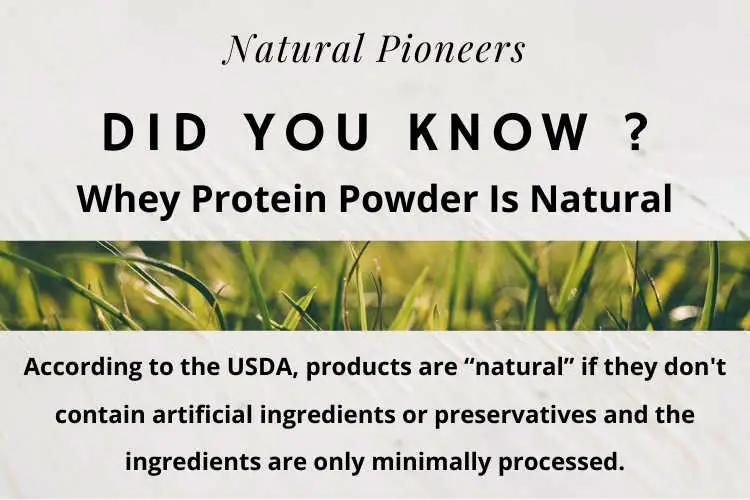
Does the process of making whey protein fit the definition of a “natural” product by the standards of the USDA?
Yes, it does. In short, whey protein is a side product when making cheese. It is heated and filtered after that. That’s it.
You’re still not convinced that whey protein is a good thing to consume? I have a little story for you.
A friend and personal trainer of mine once asked me: “Do you think twice eating whole grain bread or a whole grain tortilla?” “No”, I answered. “Well”, he continued, “they are made of carb powder (flour) – and that’s considered the most natural thing just because it’s been around for a long time.”
That got me thinking.
And still, I have months and years when I don’t feel like adding protein powder and others when I find it a useful tool especially after working out and when life is extra busy.
Conclusion: Whey protein powder is only minimally processed and therefore is a natural product according to the USDA definition of natural products.
2. Health Benefits Of Whey Protein Powder
In short, there is too much research on this topic to cram it all into this article. Hundreds of studies have researched the topic of whey protein powder over the past decades.
All compiling a large list of benefits mainly in the areas of weight management, active aging, growing and keeping muscle mass, immune health, cancer, diabetes, and intestinal health. [1]
I’ll keep it to an amount that is easily digestible while packed with scientific evidence.
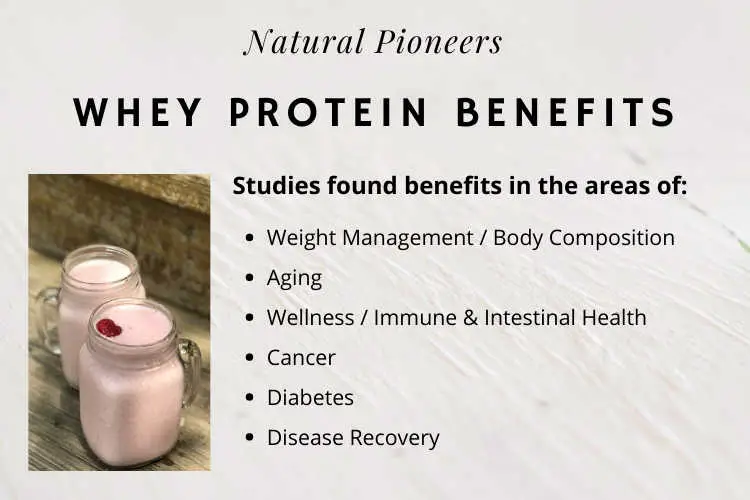
Benefits of whey protein powder:
- Whey protein is very satiating (filling), even more so than other types of protein like casein or soy. This makes it a useful addition when trying to loose weight [2]; [3]
- Highly digestible and absorbed more quickly compared to other types of protein [4]; [5]; [6]
- Studies show that whey protein is aiding weight loss. Using whey protein powder results in a reduction in calories consumed and an increase in metabolism, while maintaining muscle mass [7]; [8]; [9]; [10]
- Effective for the prevention of age-related muscle loss, as well as for improved strength and a better-looking body [11]
- In resistance-trained individuals whey protein supplementation results in greater whole body protein balance over a 24 h recovery period and enhances exercise performance and recovery [12]
- Reduces inflammation [13]
- Anti-cancer: Studies strongly suggest an anti-tumor effect of a whey protein dietary supplement [14]
- Effective at moderating blood sugar, and increasing insulin sensitivity in type 2 diabetes patients. [15]; [16]; [17]
- Reduces blood-pressure and the risk for cardiovascular disease [18]; [19]; [20]; [21]
- Lowers cholesterol levels [22]
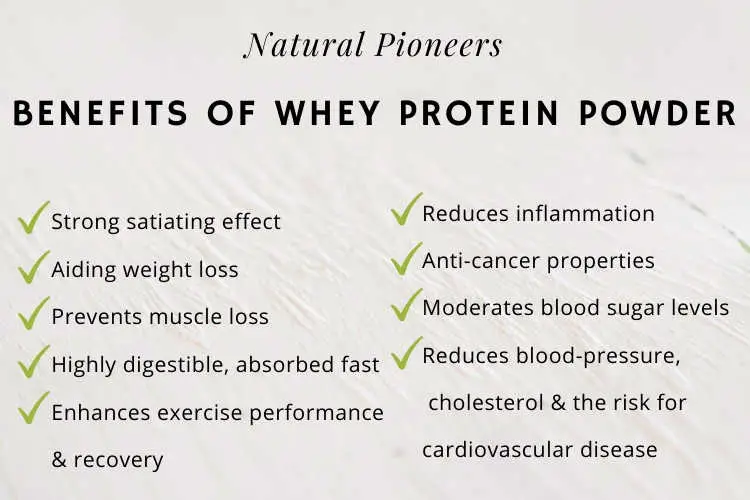
If you’re still debating whether it would be a worthwhile addition to your diet, here’s my take on it:
I personally love to run and do pilates. I work out about 5 times a week. And sometimes I come back from my run, fully exhausted, and excited to find something clean, high-protein, low fat in the fridge only to notice that my husband had just eaten the last greek yogurt we had.
Well, in those cases, when traveling, and when the fridge runs low while I am too busy to run to the store right then – that’s when I supplement.
And as mentioned before, my whey protein consumption always comes in phases. I order a 5 lbs bulk package maybe about 2 times a year.
Right now, I felt like ordering some and we at Natural Pioneers know that sharing our research on the topic will be beneficial to many of you.
Conclusion: Whey protein powder comes with numerous health benefits. The most prevalent benefits seem to be its ability to aid weight loss, benefiting healthy & active aging, growing & maintaining muscle mass, it’s anti-cancer properties, it’s ability to regulate blood sugar levels, and reducing blood pressure, cholesterol, and the risk for cardiovascular disease.
3. Is Organic Whey Better?
It’s time to clarify whey – um, why – organic protein powder is in fact superior to whey coming from conventional, “regular” dairy farms.
1. The USDA Organic seal:
Organic is a labeling term that indicates that a product has been produced through methods approved by the USDA Organic Standard. [23]
2. How is organic whey protein powder produced differently?
When opting for usually more expensive, organic whey protein powder, here’s what you spend your extra pennies for: [24]
- Produced without antibiotics
- Produced without growth hormones
- No use of GMOs (genetically modified organisms)
- No use of synthetic fertilizers, sewage sludge, and irradiation
- Highest standard of animal welfare
- 100% organic feed including pasture
- Dairy farms meet all USDA organic regulations and are overseen by the USDA
- Preventive health management to keep animals healthy
- Organic livestock has access to the outdoors year-round
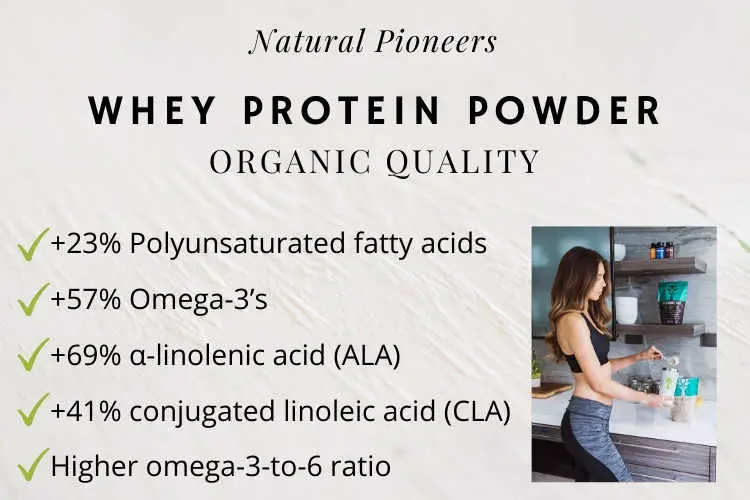
3. What’s in it for me, you ask?
We’ve already talked through the health benefits of whey protein. The added benefits when choosing an organic whey protein power are, quite simply, a better nutritional profile.
The following studies show results when comparing organic to conventional products.
Benefits of choosing organic:
- Significantly higher amounts of polyunsaturated fatty acids (+23%) and omega-3’s (+57%) (EPA+DPA+DHA) due to the high-grazing diet [25]; [26]; [27]; [28]; [29]
- Higher concentrations of α-linolenic acid (ALA) +69%, and conjugated linoleic acid (CLA) 41% [30]; [31]
- Significantly higher omega-3 to -6 ratio [32]
- Organic dairy consumption resulted in higher CLA levels in breast milk of their mothers [33]
Moreover, opting for organic protects you. Here’s how:
- Reduced risk of allergic disease [34]
- Reduced risk of overweight and obesity [35]
- Lower incidence of pesticide residues [36]; [37]
- Reduction in the risk of overall cancer [38]
- No contact with antibiotic resistant bacteria which can promote antibiotic resistance in humans [39]; [40]; [41]
Conclusion: Yes, organic whey is better. An organic product provides a superior nutritional profile with significantly higher amounts of omega-3’s, PUFAs, ALA, and CLA. Moreover, an organic product protects us from antibiotic resistant bacteria, developing allergies, weight problems, pesticides, and cancers. Non-organic, grass-fed products do not show a protective effect.
4. Combined Benefits | Whey Protein Powder & Organic Quality
When choosing to supplement with organic whey protein powder, you reap the benefits of both, whey protein powder AND organic benefits. Let’s take a look at the combined powers:
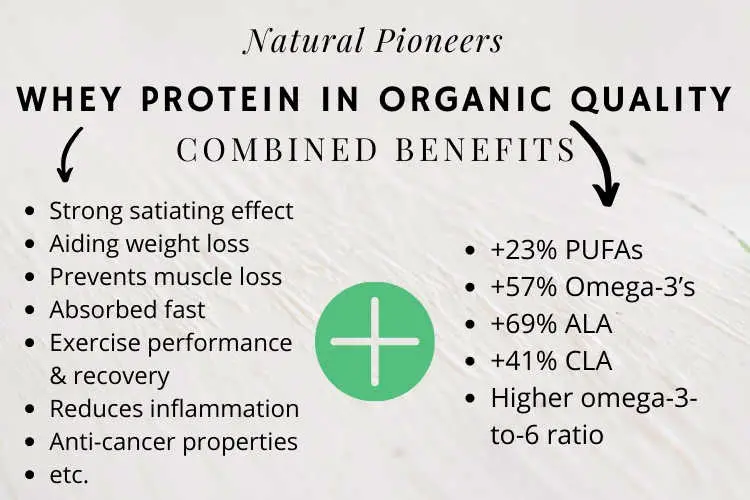
5. What Not To Buy | Protein Powder Buyer’s Guide
Up to this point we’ve taken for granted that we’re choosing a whey protein powder as supposed to a plant-based powder.
While we at Natural Pioneers like things in their most natural condition you might ask why are we not opting for a plant-based product then?
There are a couple of additional facts we took into consideration. The following list is of crucial importance when trying to find out what protein powder is of the highest quality.
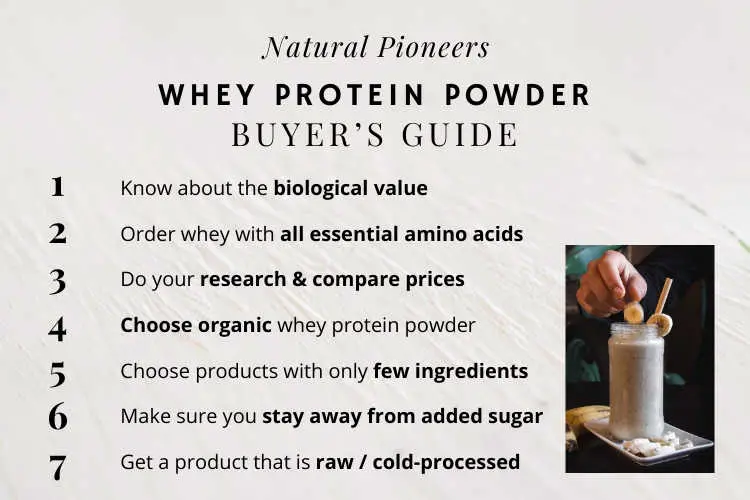
Here are 7 things to avoid when choosing a protein powder.
1. Not knowing about the biological value of a substance
The biological value indicates how much cell structure the body can build from a certain amount of protein. The higher the biological value, the less protein we need.
A protein powder should primarily contain essential amino acids that our body cannot produce itself. If your protein powder contains too many non-essential amino acids, this only loads your body with too much urea – which is a toll on our kidneys.
Let’s look at the biological value of common protein powders to see what is the best fit for our cells:
Biological value of common types of protein powder (the higher the number, the better)
- Collagen Protein Powder: 20
- Pea Protein Powder: 65
- Soy Protein Powder: 74
- Casein Protein Powder: 77
- Rice Protein Powder: 83
- Hemp Protein Powder: 87
- Egg White Powder: 88
- Whey Protein Powder: 104
You see, there’s a good reason why we choose whey protein. Whey protein powder comes with the highest biological value while providing an extensive list of benefits – for literally anyone, whether you exercise or not.
Take-away: Whey protein powder has a higher bioavailability than plant based protein powders. Therefore, it is more readily available in our cells.
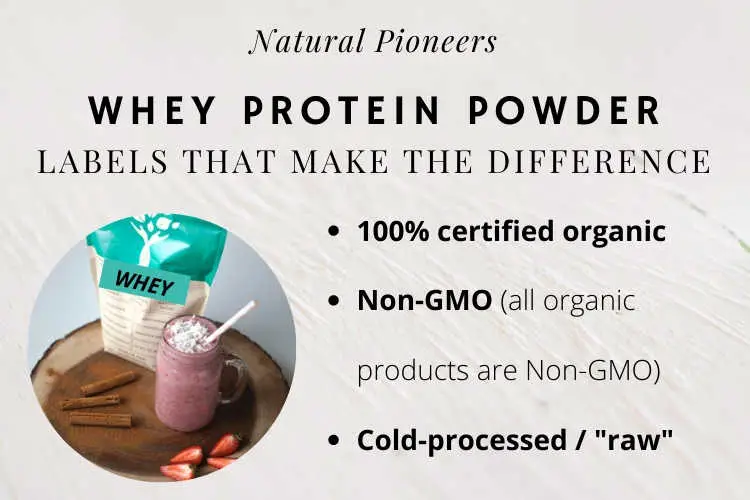
2. Ordering a product without all essential amino acids
Through a clever combination, foods with a relatively low biological value can become a biologically high-quality protein.
For example, you could mix pea, hemp and rice protein powder in a certain percentage and the compositions of each powder complement each other. This can create a biological value of up to 89%. [42]
Generally, animal protein is usually more usable than plant protein, since its amino acid composition is more similar to the one of our body.
Take-away: If you decide to opt for a protein powder that is not whey, become educated about the biological value of the product. In very few cases you’ll find it printed on the front since it usually won’t be able to keep up with whey protein powder.
3. Skipping the research and opting for overpriced options with little value
The supplement market is one of the most non-transparent industries out there. Two products with the seemingly same quality features can be priced worlds apart. Various differences in dosing, attractive packaging and empty claims only add to this industry’s reputation.
While we definitely aim to bring transparency into choosing a whey protein product, please understand, that you are responsible as well, for making a change.
In doing your research before buying you help tremendously in supporting high quality, sincere businesses while eliminating those with empty claims.
Take-away: Do your research and choose a protein powder supplement that shows quality seals and is worth it’s price.
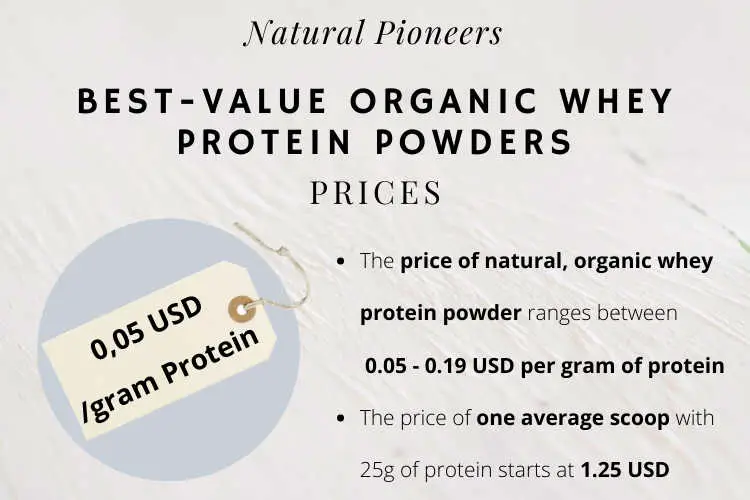
4. Choosing non-organic products (and no, non-gmo does not equal organic)
We’ve covered the benefits of organic products in chapter 3. An organic product provides a superior nutritional profile with significantly higher amounts of omega-3’s, PUFAs, ALA, and CLA.
Moreover, an organic product protects us from antibiotic resistant bacteria, developing allergies, weight problems, pesticides, and cancers. Non-organic, grass-fed products do not have this protective effect. They might still be produced with antibiotics, hormones, etc.
Please keep in mind that there are tons of products out there that show misleading claims. Organic products are automatically always Non-GMO. But non-organic non-GMO products without the organic seal still come with the full spectrum of disadvantages for our health.
And remember, only grass-fed protein powder can still come from cows treated with antibiotics, hormones while eating their pesticide covered grass.
Take-away: Look for the USDA organic seal FIRST. It is a long-term investment in your health. If the product has additional labels or seals, sure, we’ll take it.
5. Ordering products with an extensive list of ingredients (incl. vitamins)
Generally, we at Natural Pioneers prioritize a nutrient rich, organic diet full of vegetables and healthy protein. We love to add a little fruit and grains to that – but that’s mostly it.
We strongly believe that – when your diet is on track – there is no need for supplementation. When buying products with a lot of added minerals, vitamins, etc. it’s easy to lose track how much we actually consumed of a certain supplemental mineral.
It all adds up and we might be overdosing consistently. If you choose to supplement with minerals, vitamins or the like, make sure you choose only one product that you take on a daily basis or as prescribed by your doctor.
It is not necessary to choose a protein powder with added minerals, vitamins, etc.
Take-away: Choose a clean protein powder, ideally with only one ingredient – “Organic Whey Protein Powder”
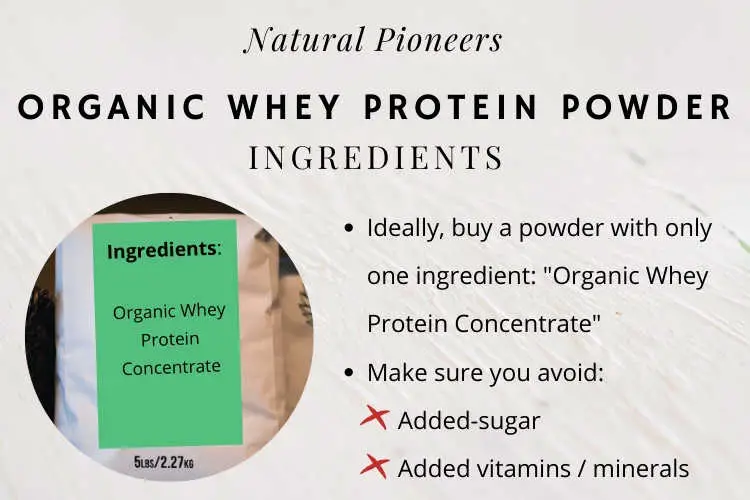
6. Choosing a product with added sugar (even if it’s “organic” sugar)
It seems like common sense, but we need to say it anyways: Avoid a product with added sugar at all cost. If you opt for a protein powder that’s flavored – and some taste truly awesome – make sure it’s sweetened with organic stevia.
7. Ordering a product that has been heat treated
Whey protein denatures when heated above 167 ° F. The molecular structure changes and the protein often becomes indigestible.
Therefore, it’s important that your protein powder is “raw” or cold processed.
If it was processed cold, you will usually find a note on the packaging.
6. Price Comparison For Natural & Organic Protein Powder
Now it’s time to show you what we’ve compiled over the past weeks of research. The following powders are all organic, natural whey protein powders. All of them have been quality checked and approved by Natural Pioneers.
We at Natural Pioneers like to get our high quality products at reasonable prices. This list will get you an idea of what the price range of organic, natural whey protein powders looks like.
Best-Value Unflavored, Natural Organic Whey Protein Powders
Ranking based on price.
- Raw Organic Whey; Raw Organic Whey; $0.05 USD/gram of protein
- AGN Roots; Whey Protein ; $0.05 USD/gram of protein
- Z Natural Foods; Whey Protein Concentrate Organic; $0.05 USD/gram of protein
- Julian Bakery; Primal Protein Organic Grass Fed Whey Protein; $0.07 USD/gram of protein
- Natural Force; Organic Whey Protein; $0.08 USD/gram of protein
- Protein17; Organic Grass-Fed Whey; $0.08 USD/gram of protein
- NorCal Organic; Classic Whey Protein; $0.09 USD/gram of protein
- The Organic Whey; Grass-Fed Whey Protein; $0.10 USD/gram of protein
- Vital Proteins; Organic Whey Protein; $0.12 USD/gram of protein
- Tera’s Whey; Organic Whey Protein; $0.14 USD/gram of protein
- The Grass Fed Whey; Organic Grass Fed Whey Protein; $0.15 USD/gram of protein
Prices may vary; last updated April/2020
You like chocolate, vanilla, strawberry & co.?
Best-Value Flavored, Natural Organic Whey Protein Powders
Ranking based on price.
- My Organic WHEY; Pure Raw Protein; $0.05 USD/gram of protein
- Norcal; Natural Organic Grass Fed Whey Protein Powder; $0.09 USD/gram of protein
- Amazing Nutrition; Amazing Formulas Organic Whey Protein; $0.09 USD/gram of protein
- Garden of Life; Grass-Fed Organic Whey Protein; $0.11 USD/gram of protein
- Natural Force; 100% Organic Whey Isolate Protein Powder; $0.12 USD/gram of protein
- Protein Milkshake; Organic Grass-Fed Protein Milk Shake; $0.14 USD/gram of protein
Prices may vary; last updated April/2020
